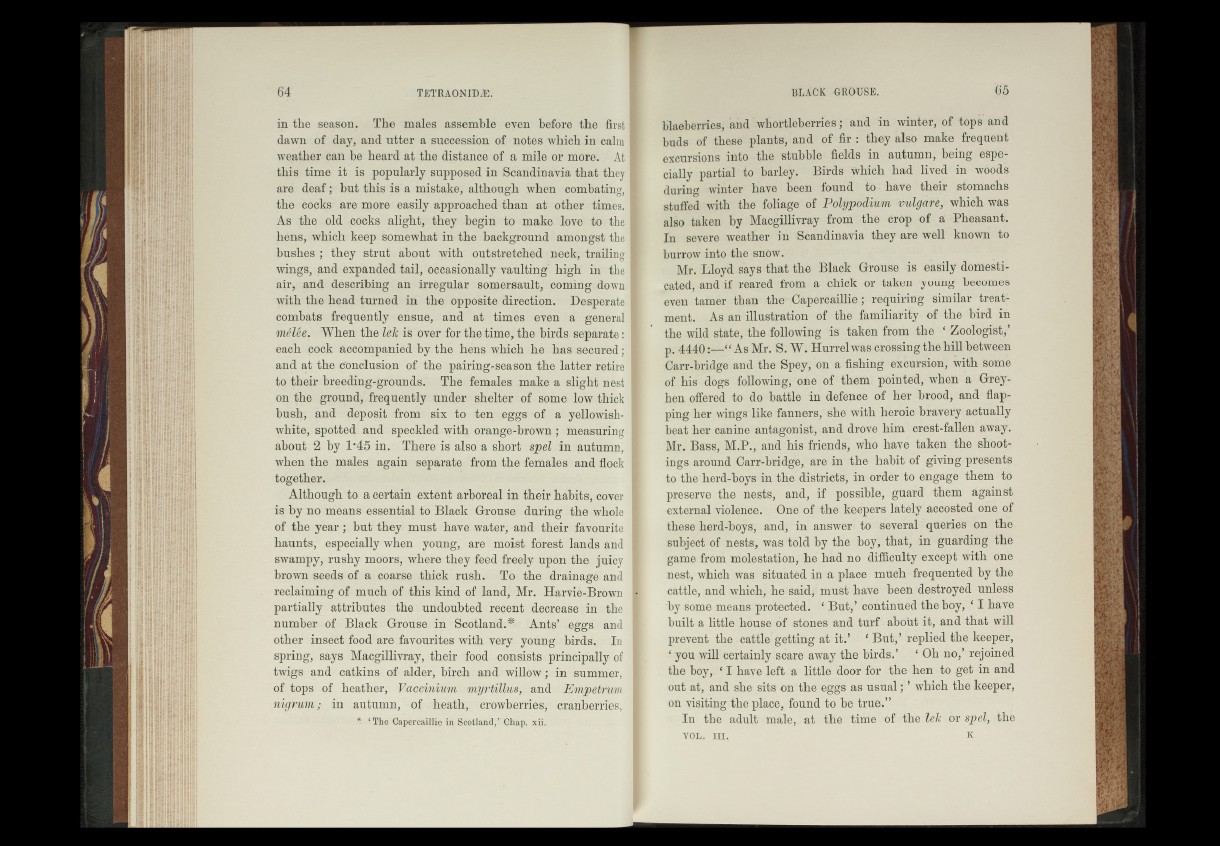
in the season. The males assemble even before the first
dawn of day, and utter a succession of notes which.in calm
weather can be heard at the distance of a mile or more. At
this time it is popularly supposed in Scandinavia that they
are deaf ; but this is a mistake, although when combating,
the cocks are more easily approached than at other times.
As the old cocks alight, they begin to make love (to the
hens, which keep somewhat in the background amongst the
bushes ; they strut about with Anjtstretched • neck, trailing
wings, and expanded tail, occasionally vaulting" high in..-the
air, and describing an irregular somersault,- eomirigcduwn
with the head turned inhthe' opposite direction. Desperate
combats frequently ensue, and at times even a ‘.general
melee. When the lek is over for the time, the birds separate:
each cock accompanied by the hens which he has'secared;
and at the conclusion of the pairing? season the latter ^retire
tq theirbreeding?grounds.j The females, make a slightanesll
on the ground, , frequently under shelter of some low-thick
bush, and deposit from six to ten .^gg^sof a yefidswish-
white, spotted and speckled, with orange?brown ; measuring
about 2 by 1?45, in. There is .also, a short spel in autumn,
when .the males again separate from the females and flock
together.
" . Although to a certain extent arboreal in their habits,,cover
is by;no means, essential to Black Grouse during the whole
of the, year; but'they, must‘have water, and« their favourite
haunts, especially when young, -are moist. forest lands ‘and
swampy; rushy moors, where they feed freely upon the, . juicy
brown.seeds of a coarse thick rush. .To* the;,dminageiand
reclaiming of mudfcuof .this kind of land";‘Mr. Harvie-Brown
partially attributes the undoubted recent decrease :in®She
number of * Black -"Grouse, in •Scotland:?.’ Ants’-':eggs r and
other insect food are favourites with very young :birds., In
spring, says Macgillivray, their 'food consists , principally of
twigs and catkins of alder., birch and-willow; in summer,
of tops of heather, ■Vaceimum^miyrMlhos, I:and Empetrum.
nigrum; in autumn,' of ,‘heath,f^esqWhbrries, cranberries,
* -The Capercaillie ia-S6dtland,^h.ap. xii.
blaeberries, and whortleberries;; and i n ' winter, of tops and
buds of these plants, and of fir: they also make frequent
excursions into the stubble, fields in autumn, being espe*
cially partial to barley. Birds which had lived in woods
during winter have been found to| have their stomachs
stuffed with the foliage of Polypodium vulgare,; which was
also taken by Macgillivray from the crop of a; -Pheasant.
In severe weather in Scandinavia they are well known to
burrow into the snow.
: Mr. Lloyd'says that the Black Grouse 4s easily domesticated,
and if reared from a chick or taken young becomes
even tamer than the; Capercaillie; requiring similar treatment.
As an illustration of the'familiarity -of the bird in
the wild state, the following is taken from the ‘ Zoologist,’
p. 4440 As Mr. S. W. Hurrelwas.crossingdhe billb’etween
Carr-bridge and the Spey, on a fishing excursion, with some
of his dogs following, one of them, pointed^ -when a Greyhen
offered to do battle -in- defence of her brood, and flapping
her wings like fanners, -’Shewith heroic -bravery actually
beat her canine antagonist, and.drove him crest-fallen away,
Mr. Bass, M.P., and his friends, who have taken the shootings
around Carr-bridge, are in -the habit of giving-presents
to the herd-boys in |tle districts', in order to engage’ them to
preserve the nests, and, if possible, guard them against
■external violence. One of the^keepers lately accosted one of
these herdsboys, and, in answer to several- queries* on the
subject of nests, was told by the boy,-that, in guarding the
game from molestation, he had no difficulty except with one
nest, which was situated in a place milch frequented by the
-cattle, and which,‘hesaid^ must-have been destroyed unless
by some means protected. < Bd%* continued the boy, ‘ I have
built a little house of stones And turf aboht it,; and that will
prevent the .cattle getting at4;t$& * But,’ replied the keeper,
‘ you will certainly scare aw'ayithe birds.’ ‘ Oh no,’"rejoined
the boy,. ‘ I have left a little door for the hen., to get in and
out at, and she sits on the eggs as usual; ’ whieh the keeper,
on visiting the place, found to be true.”
In the adult male, at-the time -ofHhn.M; btspek, the
vol. hi. k ,